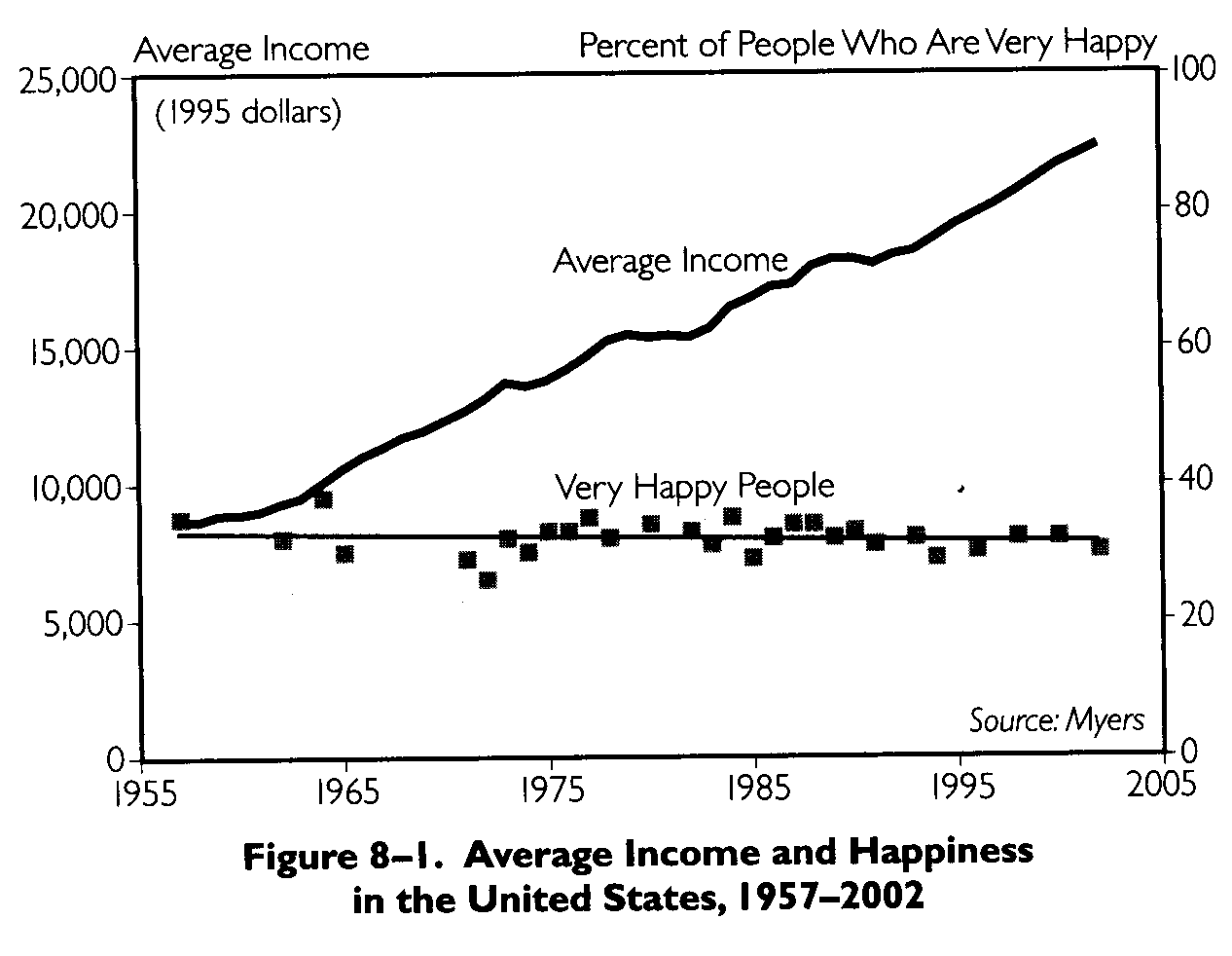Understanding Human Happiness and Well-Being

An Age-Old Challenge
Understanding the determinants of human happiness and well-being is important in the quest for ecological sustainability (and social justice), because it helps us decide how to best use the limited material throughput available, and identify what other, non-material factors are important. Philosophers, theologians and social thinkers have wrestled with these questions for centuries. Their conclusions vary in detail but all agree that both material and non-material factors are important.
New Data from Social Scientists
More recently various social scientists have researched human happiness around the world.
1 Some common findings emerge, despite using different experimental and survey methods and exploring the issue in very different countries. One of the most common conclusions is that money or financial wealth is not the most important determinant. Beyond an annual per capita income equivalent to $10,000 in Purchasing Power Parity [glossary term], happiness is a function of non-material factors. The support of family, friends and community, a meaningful role in life, and basic freedoms are much more important at all levels of wealth beyond this range.
2Economic Growth and Personal Happiness
Studies of the relationship between economic growth measured by GDP and personal levels of happiness report

that happiness increases with GDP while GDP is growing up to a certain level. Beyond this level, GDP increases do not lead to more personal happiness. In every country studied, reports of personal happiness level off after GDP continues to grow. Even five-fold increases in GDP, as occurred in Japan over the 20
th century, do not lead to increases in personal happiness. The happiness that can be derived from material goods appears to have psychosocial limits, just as there are biophysical limits to the services ecosystems can provide.
This relationship holds for both men and women, across age groups, and income levels. This relationship has endured over the decades that such research has been conducted. It also supports the earlier observations of thinkers and philosophers, and is consistent with the intensely social character of human nature.
Consumption and Objective Indices of Well-Being
Another way of demonstrating this disconnect between material consumption and well-being is to consider the role of per capita energy consumption as it relates to various objective indicators. Energy use is a good index of general consumption as all consumption involves the use of energy. Infant mortality and female life-expectancy at birth are two of the best composite indices of well-being, integrating complex interactions among nutrition, health care and environmental exposure over an extended period. Along with average per capita food availability, and the UN’s Human Development Index [glossary], they indicate that a decent quality of life is achievable with 50-70 GJ per capita energy consumption (Japan and France used about 70 GJ/capita in the 1960’s).
Only marginal gains in these indicators occur if per capita energy consumption increases to 110 GJ (for comparison, the levels for France and Germany were in the 170 GJ/capita range in 2001). Beyond this level there are no further gains in well-being. Yet many affluent countries use in excess of 300 GJ per capita, while the world’s poorest use less than 30
2. In addition, personal freedoms as measured by the Freedom Index [glossary] are compatible with societies using as little as 20 GJ/capita,
[1] demonstrating that basic freedoms do not require a high level of material consumption.
Personal Costs of Materialism
Not only is a high level of material consumption unnecessary for happiness and well-being, but too much can actually be personally harmful. A strong orientation to materialism is associated with a variety of psychological and physical health problems3. Studies from many different nations, involving preschoolers to the elderly and both genders, show that placing a high value on financial wealth and material goods, regardless of income levels, is associated with higher levels of anxiety, depression, and low life satisfaction. Individuals with a strong materialistic orientation are more likely to be insecure, engage in antisocial behavior, have personality disorders, and experience difficulties in intimate relationships.
Materialistic values detract from personal happiness and well-being by reinforcing feelings of insecurity. Whatever positive feelings occur from material acquisitions are generally short lived, and require more acquisitions to reinstate the positive feeling. This creates an acquisition treadmill, characterized by unhappiness and insecurity which stimulates more acquisitions and subsequent insecurities. In the process, the kinds of interpersonal relationships that contribute to an enduring sense of well-being are neglected. Less empathy and intimacy are experienced, affecting others, including the children of those with high materialistic orientations. It is hypothesized that unmet security needs in childhood give rise to strong materialistic orientations, which are then passed on to the next generation.
Economic Theory Misjudges Basis of Human Well-Being
Mainstream economic theory is at variance with the disconnect between materialism and personal happiness. It assumes people are insatiably acquisitive, and that the greatest social good comes from individuals freely making market decisions in their personal best interests. Mainstream economic theory views people as highly individualistic, and the expression of this individualism in the market as the most certain and efficient way to achieving the greatest good for the greatest number.
Mainstream economists have argued that considerations for others, or sharing of resources is actually counterproductive to market solutions to environmental degradation or social inequities. Anything that interferes with market operations – limits, regulations, quotas or notions of justice or altruism – are seen as distorting the market, and thereby reducing the wealth of the community.
This view of a single dominant human need is overly simplistic in terms of the complex range and interdependence of needs identified by many researchers and thinkers4,5. It totally ignores the social component of satisfying human needs, and overlooks the personal and social benefits of ethical decisions and behaviors. It fails to recognize the non-material determinants of personal happiness, and the non-market factors which determine well-being.
A great many ecosystem services upon which we depend for our survival are non-market services, and by their very nature always will be. In addition, many of the factors that determine our happiness and well-being are not part of the market, and never can be. The view of self-interest as the driver of the common good overlooks the benefits derived from a range of public goods, from a money system and sewers, to health care and education. It fails to recognize that in some circumstances individual preferences are in conflict with social goods
5 (see
Economics For Community), and that mechanisms other than the market are required to ensure personal happiness and well-being.
Role of Social Comparisons
We are inherently social creatures and our sense of self-worth and happiness derives in part from comparing our self with others. If others’ wealth or income is different than ours, then we are more or less satisfied with our own level by comparison, regardless of our absolute level (assuming a minimal amount to meet basic human needs). Consequently, if there are considerable differences in wealth and income in a society, then there are also likely to be higher levels of dissatisfaction. Wealth and income are typically concentrated in a small proportion of the community, leaving the majority of people dissatisfied by comparison.
Comparisons are generally made with those in a referent group, people we feel we should be equal with, or strive to emulate. Thus, even those who have considerable wealth and income compare themselves to others who are well off. Such comparisons are said to stimulate competition and raise the standards for everyone. One of the consequences of this process is that there is greater dissatisfaction for those who are left behind.
Another consequence is that once the competition for more consumption starts, it triggers a continuing cycle. It is like standing up in a theater to better see a performance. If everyone does it, then no one is better off, until someone stands on their seat and the cycle is repeated. Such increases in consumption to improve one’s relative position add little if anything to one’s enduring sense of well-being. But such competitive comparisons increase throughput and contribute to both ecological degradation and social inequities.
Good News for a Sustainable Future: Why Solutions Are Attractive
The relationships described above make it clear that a meaningful and satisfying quality of life is possible with considerably less throughput than now occurs in affluent and highly developed countries. A challenge for the future is to determine the best allocation of sustainable throughput levels to achieve the quality of life desired. What is clear is that leaving this allocation solely to market forces alone will not achieve sustainable scale (see
Defunct Economic Theories, and
Economics For Community).
The finding that non-material, quality of life factors are among the most important determinants of both subjective reports of human happiness and objective indices of well-being, is good news in terms of the opportunities to organize our societies from a sustainable scale perspective. Focusing on the dual objectives of reducing material throughput and increasing qualitative development should allow societies to remain within sustainable ecological scale while generating personal happiness and well-being.
The sustainable scale problems we face are unprecedented and serious; but there are solutions available and they are attractive. The solutions are attractive for a number of reasons:
- Ecological sustainability and social justice are more desirable than ecological degradation and social disintegration
- While global limits on throughput are required, the solutions are local and will engage large numbers of people in a common cause; everyone will have meaningful contributions to make
- The policy solutions available to solve sustainable scale problems have been used successfully with other problems; we have experience with most of them, and their familiarity should increase our confidence of success
- We know how to produce goods efficiently, and meeting basic human needs with the necessary goods should be relatively easy; this can occur as well as increasing leisure time
- Individual freedom to pursue personal interests should increase dramatically with a focus on qualitative development within a sustainable economy
- Considerable challenges will persist to engage people’s creative capacities and stimulate continuous qualitative development
- The result should be greater levels of personal well being and happiness, and stronger more vibrant communities.
Our biggest challenges to implementing these attractive solutions is fostering the political will to put aside powerful vested interests who refuse to give up the short term benefits they derive from the current paradigm.
[1] A key question from an optimal scale perspective is whether the 70-110 GJ per capita range of consumption is ecologically sustainable, as it is the absolute and not per capita energy demand that is relevant. Fortunately, many opportunities exist for increasing the efficiency of energy use (see Sustainable Business Practices).
References
1Lane, R.E.,
The Loss of Happiness in Market Democracies. Yale University Press, New Haven, 2000.
2Smil, Vaclav. Energy at the Crossroads: Global Perspectives and Uncertainties. Cambridge, MA: The MIT Press, 2003, p. 105.
3Kasser, Tim. The High Price of Materialism. Cambridge, MA: The MIT Press, 2002.
4Max-Neff, M. Development and Human Needs. In P. Enkins and M.Max-Neff, Real-life Economics: Understanding Wealth Creation. London: Routledge, 1992: pp. 197-213.
5Daly, Herman and J. Cobb. For the Common Good: Redirecting the Economy toward Community, the Environment and a Sustainable Future. Boston: The Beacon Press, 1989.